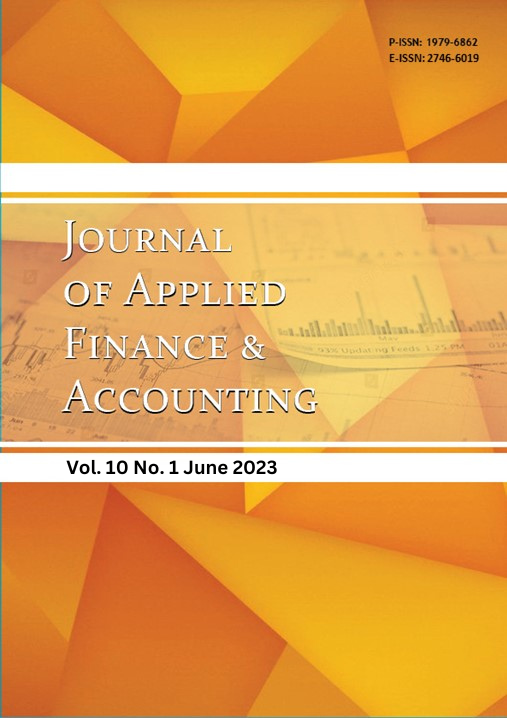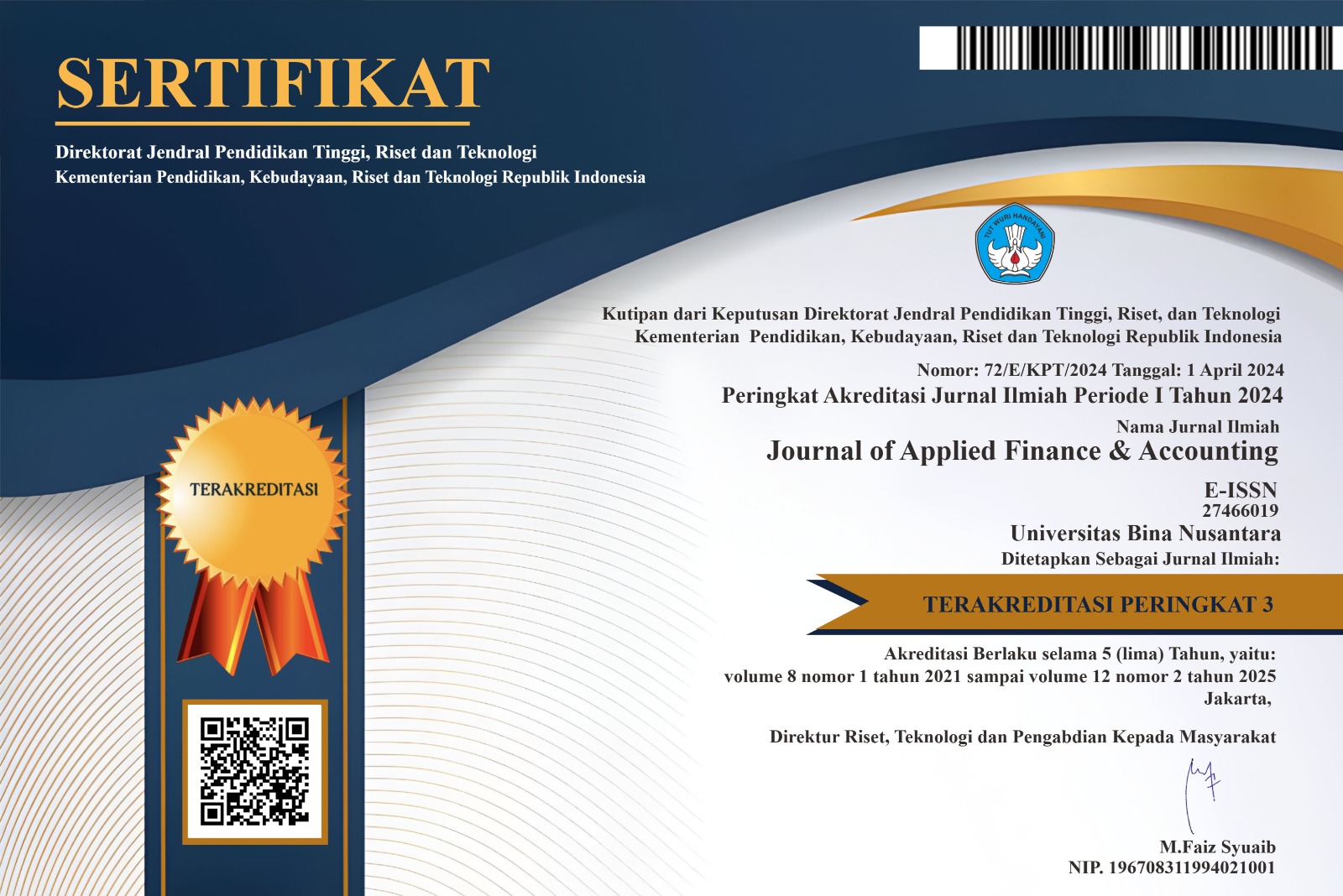UNMASKING FINANCIAL DECEPTION: UNRAVELING THE FRAUD HEXAGON’S INFLUENCE ON DETECTING FINANCIAL STATEMENT FRAUD IN INDONESIAN PUBLIC COMPANIES
DOI:
https://doi.org/10.21512/jafa.v10i1.9927Keywords:
Corporate Governance, Fraud Hexagon, Fraud Red Flag, Fraudulent Financial Reporting, Indonesian Public CompanyAbstract
This study examines the influence of the fraud hexagon on the likelihood of financial statement fraud in Indonesian public companies with stock values below IDR 100 that were listed on the Indonesia Stock Exchange (IDX) from 2018 to 2020. The study population comprises sixty companies with stock values below IDR 100 for three consecutive years listed on the IDX. The objective sampling technique was employed to select a sample of 48 companies that met the research criteria, resulting in 144 observations. Data analysis was performed using logistic regression. The findings reveal that financial stability and change in auditors significantly impact identifying financial statement fraud, while financial targets, changes in directors, collusion, inefficient monitoring, and the frequency of C.E.O. photos show no influence. These results provide valuable insights for detecting and preventing financial statement fraud in Indonesian public companies with low stock values.
References
ACFE 2020 report to the nations. (n.d.). Retrieved January 9, 2022, https://www.acfe.com/report-to-the-nations/2020/
Achmad, T., & Pamungkas, I. D. (2019). Fraudulent Financial Reporting Based on Fraud Diamond Theory: A Study of the Banking Sector in Indonesia. JIAFE (Jurnal Ilmiah Akuntansi Fakultas Ekonomi), 4(2), 135–150. https://doi.org/10.34204/JIAFE.V4I2.1112
Ahmadiana, N. S. S., & Novita, N. (2018). Prediksi Financial Statement Fraud melalui Fraud Triangle Theory | Ahmadiana | Jurnal Keuangan dan Perbankan. Jurnal Keuangan Dan Perbankan, 14(2), 77–84. http://journal.ibs.ac.id/index.php/jkp/article/view/130
Albrecht, W. S., Albrecht, C. O., Albrecht, C. C., & Zimbelman, M. F. (2012). Fraud Examination. South-Western Cengage Learning, 696. https://doi.org/10.1017/CBO9781107415324.004
Anggraini, W. R., & Suryani, A. W. (2021). Fraudulent financial reporting through the lens of the fraud pentagon theory. Jurnal Akuntansi Aktual, 8(1), 1–12. https://doi.org/10.17977/UM004V8I12021P001
Ariyanto, D., Jhuniantara, I. M. G., Ratnadi, N. M. D., Putri, I. G. A. M. A. D., & Dewi, A. A. (2021). Fraudulent financial statements in pharmaceutical companies: Fraud pentagon theory perspective. Journal of Legal, Ethical and Regulatory Issues, 24(6), 1–9. https://doi.org/10.5267/J.AC.2021.5.009
Chantia, D., Guritno, Y., Sari, R., & Pembangunan Nasional Veteran Jakarta, U. (2021). Detection of Fraudulent Financial Statement : Fraud Hexagon S.C.C.O.R.E Model Approach. Prosiding B.I.E.M.A. (Business Management, Economic, and Accounting National Seminar), 2(0), 594–613. https://conference.upnvj.ac.id/index.php/biema/article/view/1750
Citra Mulyandani, V., & Rahayu, S. (2021). The Role Of Fraud Pentagon Theory In Detecting Fraudulent Financial Statements In Banking Companies Listed On The Indonesia Stock Exchange In 2017. Aijbm.Com, 4(09). https://www.aijbm.com/wp-content/uploads/2021/09/C492227.pdf
Cressey, D. R. (Donald R. (1973). Other people's money; a study in the social psychology of embezzlement. Patterson Smith.
Gevanry Sagala, S., & Siagian, V. (2021). Pengaruh Fraud Hexagon Model Terhadap Fraudulent Laporan Keuangan pada Perusahaan Sub Sektor Makanan dan Minuman yang Terdaftar di BEI Tahun 2016-2019. Jurnal Akuntansi, 13(2), 245–259. https://doi.org/10.28932/JAM.V13I2.3956
Handoko, B. L. (2021). Fraud Hexagon dalam Mendeteksi Financial Statement Fraud Perusahaan Perbankan di Indonesia. Jurnal Kajian Akuntansi, 5(2), 176–192. https://doi.org/10.33603/JKA.V5I2.5101
Handoko, B. L., & Tandean, D. (2021). An Analysis of Fraud Hexagon in Detecting Financial Statement Fraud (Empirical Study of Listed Banking Companies on Indonesia Stock Exchange for Period 2017-2019). A.C.M. International Conference Proceeding Series, 93–100. https://doi.org/10.1145/3457640.3457657
Imtikhani, L., & Sukirman, S. (2021). Determinan Fraudulent Financial Statement Melalui Perspektif Fraud Hexagon Theory Pada Perusahaan Pertambangan. Jurnal Akuntansi Bisnis, 19(1), 96–113. https://doi.org/10.24167/JAB.V19I1.3654
Johnstone, K. M., Rittenberg, L. E., Johnstone, K. M., & Gramling, A. A. (n.d.). Auditing : a risk-based approach to conducting a quality audit. 919. Retrieved January 9, 2022, from https://books.google.com/books/about/Auditing_A_Risk_Based_Approach_to_Conduc.html?hl=id&id=vBGFCwAAQBAJ
Mukaromah, I., Ilmiah, G. B.-K. J., & 2021, undefined. (2021). Fraud Hexagon Theory dalam Mendeteksi Kecurangan Laporan Keuangan pada Perbankan yang Terdaftar di Bursa Efek Indonesia Tahun 2015-2019. Journal.Stekom. Ac.Id, 14(1), 61–72. https://journal.stekom.ac.id/index.php/kompak/article/view/355
Naqvi, A. S. (2020). Artificial intelligence for audit, forensic accounting, and valuation : a strategic perspective. Wiley. https://www.wiley.com/en-us/Artificial+Intelligence+for+Audit%2C+Forensic+Accounting%2C+and+Valuation%3A+A+Strategic+Perspective-p-9781119601937
Nurardi, D. S., & Wijayanti, R. (2021). DETERMINAN FINANCIAL STATEMENT FRAUD DENGAN ANALISIS FRAUD HEXAGON MODEL (Studi Empiris pada Perusahaan Sektor LQ 45 yang Terdaftar di Bursa Efek Indonesia Periode II Agustus-Januari 2016-2019) | Proceeding of The URECOL. Proceeding of The 13th University Research Colloquium 2021: Mahasiswa (Student Paper), 13, 430–441. http://repository.urecol.org/index.php/proceeding/article/view/1379
PwC's Global Economic Crime and Fraud Survey 2020. (2020). https://www.pwc.com/gx/en/services/forensics/economic-crime-survey.html
Rankin, M., Ferlauto, K., McGowan, S. (Susan C. ), & Stanton, P. A. (n.d.). Contemporary issues in accounting. 362. Retrieved January 17, 2022, from https://www.wiley.com/en-ie/Contemporary+Issues+in+Accounting%2C+2nd+Edition-p-9780730343530
Rukmana, H. S. (n.d.). Pentagon Fraud Effect on Financial Statement Fraud and Firm Value Evidence from Indonesia. Seajbel.Com, 16. Retrieved January 23, 2022, from https://seajbel.com/wp-content/uploads/2018/10/seajbel5_251.pdf
Tarjo, Anggono, A., & Sakti, E. (2021). Detecting Indications of Financial Statement Fraud: A Hexagon Fraud Theory Approach. AKRUAL: Jurnal Akuntansi, 13(1), 119–131. https://doi.org/10.26740/JAJ.V13N1.P119-131
Utami, E. R., Muhammadiyah, U., Jalan, Y., Selatan, L., Tirto, T., Kasihan, B., & Pusparini, N. O. (2019). The Analysis Of Fraud Pentagon Theory And Financial Distress For Detecting Fraudulent Financial Reporting In Banking Sector In Indonesia (Empirical Study Of Listed Banking Companies On Indonesia Stock Exchange In 2012-2017). 60–65. https://doi.org/10.2991/ICAF-19.2019.10
Vousinas, G. L. (2019). Advancing theory of fraud: the S.C.O.R.E. model. Journal of Financial Crime, 26(1), 372–381. https://doi.org/10.1108/JFC-12-2017-0128/FULL/XML
Weygandt, Jerry J ; Kimmel, Paul D ; Kieso, D. E. (2017). Financial accounting (3rd Edition/IFRS Edition). 838.
Downloads
Published
Issue
Section
License
Authors who publish with this journal agree to the following terms:
Authors retain copyright and grant the journal right of first publication with the work simultaneously licensed under a Creative Commons Attribution License that allows others to share the work with an acknowledgement of the work's authorship and initial publication in this journal.
Authors are able to enter into separate, additional contractual arrangements for the non-exclusive distribution of the journal's published version of the work (e.g., post it to an institutional repository or publish it in a book), with an acknowledgement of its initial publication in this journal.
Authors are permitted and encouraged to post their work online (e.g., in institutional repositories or on their website) prior to and during the submission process, as it can lead to productive exchanges, as well as earlier and greater citation of published work (See The Effect of Open Access).





